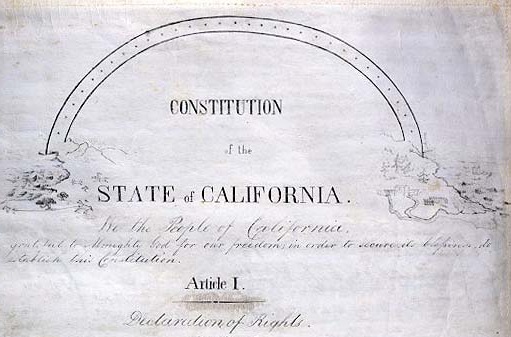
California Constitution. (Photo: www.sos.ca.gov)
Impeachment by the California Legislature
Elected state officers, members of the State Board of Equalization, and judges of state courts are subject to impeachment
By Chris Micheli, December 11, 2019 6:15 am
California’s Government Code Title 1, Division 4, Chapter 7, Article 2 provides for impeachment by the California Legislature.
Government Code Section 3020 provides that state officers elected on a statewide basis, members of the State Board of Equalization, and judges of state courts are subject to impeachment for misconduct in office. Section 3020.5 states that the Senate, when sitting as the court of impeachment, is a court of record and the officers of the Senate are the officers of the court.
Section 3021 specifies that all impeachments must be by resolution adopted, originated in, and conducted by managers elected by the Assembly. Section 3022 requires that the managers are to prepare articles of impeachment, present them at the bar of the Senate, and prosecute them. The trial is to be before the Senate, sitting as a court of impeachment.
Section 3023 states that, when an officer is impeached by the Assembly for a misdemeanor in office, the articles of impeachment shall be delivered to the President of the Senate. Section 3024 requires the Senate to assign a day for the hearing of the impeachment and inform the Assembly of the date.
Section 3025 requires the Senate President to serve the defendant with a copy of the articles of impeachment with a notice to appear and answer at the appointed time and place. Section 3026 requires the service to be made personally upon the defendant. Section 3027 states that, if the defendant does not appear, then the Senate may assign another day for hearing the impeachment or may proceed to trial and judgment in the absence of the defendant.
Section 3028 provides that, when the defendant appears, then the defendant may object in writing to the sufficiency of the articles of impeachment, or the defendant may answer the articles by an oral plea of not guilty. Section 3029 requires the defendant to answer the articles. If the defendant pleads guilty or refuses to plead, then the Senate must render judgment of conviction against him.
Section 3030 provides, if the defendant pleads not guilty, then the Senate must try the impeachment at the time it appoints. The plea is then entered upon the Senate Journal. Section 3031 states that the Senate Secretary must administer to all members of the Senate an oath truly and impartially to hear, try, and determine the impeachment. No member of the Senate can act or vote upon the impeachment, or upon any question arising thereon, without having taken such oath.
Section 3032 specifies that the defendant cannot be convicted on impeachment without the concurrence of two-thirds of the members elected. If two-thirds of the members elected do not concur in a conviction, then the defendant must be acquitted. Section 3033 states that, after conviction and at the time appointed by the Senate, the Members of the Senate must pronounce judgment, in the form of a resolution entered upon the Senate Journal.
Section 3034 states, on the adoption of the resolution by a majority of the members present who voted on the question of acquittal or conviction, it becomes the judgment of the Senate. Senate 3035 specifies that the judgment may be that the defendant be suspended, or that the defendant be removed from office and disqualified to hold any office of honor, trust, or profit under the State.
Section 3036 provides that, if judgment of suspension is given, during the continuance of the judgment the defendant is disqualified from receiving the salary, fees, or emoluments of the office. Section 3037 notes, whenever articles of impeachment against any officer subject to impeachment are presented to the Senate, the officer is temporarily suspended from his or her office and cannot act in his or her official capacity until he or she is acquitted.
Section 3038 specifies that, upon temporary suspension of any officer other than the Governor, the office must at once be temporarily filled by an appointment made by the Governor, with the advice and consent of the Senate. The office is to be filled by the appointee until the acquittal of the party impeached or, in case of his or her removal, until the vacancy is filled at the next election.
Section 3039 provides that, if the Lieutenant Governor is impeached, notice of the impeachment must be immediately given to the Senate by the Assembly in order that another president of the Senate may be chosen. Section 3040 specifies that, if the offense for which the defendant is convicted on impeachment is also the subject of an indictment or information, then the indictment or information is not barred.
- Conservation Banks - February 22, 2026
- Mergers of Unincorporated Associations - February 21, 2026
- A Historic Look at Bill Introductions in the California Legislature - February 21, 2026





Lets impeach all of the CA lawmakers that decided we “didn’t know what was good for us” and decided to raise our gas tax without a vote. F**k them.